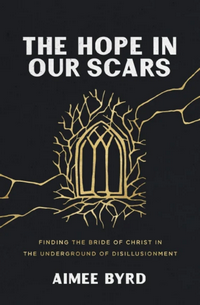 The Hope in Our Scars:
The Hope in Our Scars:
Finding the Bride of Christ in the
Underground of Disillusionment
by Aimee Byrd
DETAILS: Publisher: Zondervan Publication Date: May 7, 2024 Format: Paperback Length: 206 pg. Read Date: May 19-26, 2024

What’s The Hope in Our Scars About?
There are three strands of thought in this book (although two are pretty related, but they struck me as separate).
The first centers on Byrd and her family as they search for a new church home after the events that led to them leaving their long-time church.
The second deals with others—some by name, some more abstract and in a collective sense—who are dealing with disillusionment about the Church today—due to Spiritual abuse, sexual misconduct, financial fraud, coverups of all of the above, and so on. Some of this disillusionment leads to people wandering in a wilderness, looking for a local congregation to call home—others will wander far from the fold.
The third—and most important—discusses the way that the woman/the bride in the Song of Songs longs for her love/her husband. Individual believers should find themselves in that same situation—longing for the presence of our Lord in the place He promised to meet with us—as part of His Bride.
Song of Songs
As with her 2022 book, The Sexual Reformation, the primary portion of Scripture that Byrd focuses on is the Song of Songs. She rejects more contemporary approaches to the text in favor of an allegorical understanding. I really wish we’d get an entire book from her just on the song.
She’s not (as far as I know) a Hebrew scholar, so I’m not looking for a commentary. But Byrd’s a well-read layperson, and largely an autodidact, too—not the type for a technical work, but she has all the tools to provide a great reader’s guide or something along those lines.
So, what did I think about The Hope in Our Scars?
I really don’t know. I really didn’t get the organization—I’m assuming there was one, but I didn’t see it. It really felt to me while reading it that Byrd was just meandering around bouncing from one idea to another, picking up and dropping one of those strands every so often. It’s probably best to think of this as a series of mini-essays loosely connected by themes.
That said—I really appreciated a lot of what she said while pinballing all over. There was a lot of gold there—particularly in the Song of Songs discussion. But beyond that, she just expressed so well struggles so many of us go through. For example, when Byrd just discussed some of the challenges believers go through, how discouraging, how isolating, how alienating it is when we can’t be open with our brothers and sisters to talk about it—either because they refuse to listen, or can’t understand.
This is not her best work—but it might be Byrd at her most heartfelt. She’s definitely pointing to problems the Evangelical and Reformed expressions of the Church in the U.S. need to deal with, both for organizational health and the well-being of the members—more importantly to our witness to a lost and dying world. She’s light on solutions, or proposed solutions (which is probably for the best, as frustrating as it might be while reading). I hope she gets a hearing and that others who are pointing to the same issues do as well.

This post contains an affiliate link. If you purchase from it, I will get a small commission at no additional cost to you. As always, the opinions expressed are my own.
![]()


